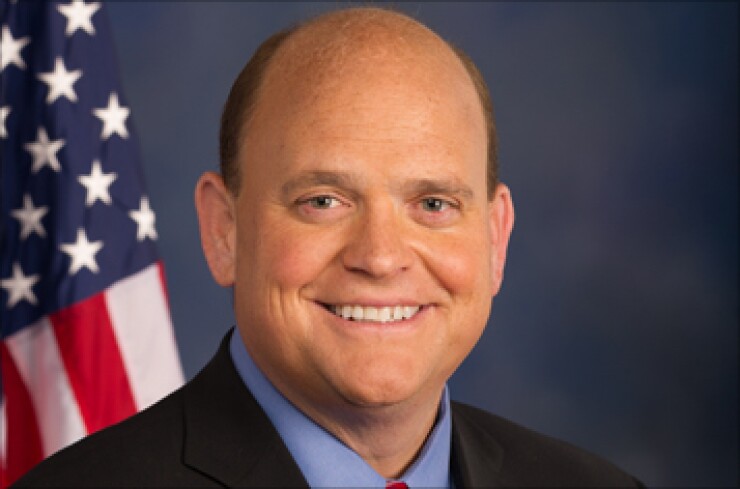
WASHINGTON – U.S. lawmakers are stepping up scrutiny of colleges and universities with endowments of more than $1 billion and are threatening to introduce legislation that could jeopardize the tax-exempt status of their bonds.
Rep. Tom Reed, R-N.Y., a member of the House Ways and Means committee, is currently tweaking a draft of the Reducing Excessive Debt and Unfair Costs of Education Act, which would require the 56 private colleges and universities with endowments over $1 billion to provide a portion of the profits earned from the investment of this money to students from working class families for tuition relief.
An outline of Reed's still-in-the-works bill states that schools with endowments of more than $1 billion would be required to pay 25% of endowment earnings to working-family students, which it defines as those whose family incomes fall between 100-600% of the poverty line.
Should institutions not comply with regulations they would face increasing penalties over three years. For the first year of noncompliance, they would have a 30% tax, for the second year a 100% tax, and for the third year, a loss of tax-exempt status.
There is no current endowment spending requirement for private colleges. But they have increasingly come under fire for rising tuition rates despite stowing away millions annually in tax-exempt funds.
Reed said the House Ways and Means Committee began the inquiry into tax-exempt endowments following concerns they were not being used for educational funds but instead for campus enhancements like "state-of-the-art gyms, rock walls, and even a lazy river." "It is a disservice to the next generation of student that colleges continue to stock pile large sums of money that are tax-exempt, and for which donors receive tax deductions, while tuition costs continue to rise," Reed said.
Chuck Samuels, a partner at Mintz Levin and counsel to the National Association of Health and Educational Facilities Finance Authorities, said,
"I think a bill like this is a message bill and perhaps it will facilitate good discussion of the purposes and uses of endowments."
Because private colleges are classified as nonprofits, their endowments receive tax-exempt status. Since they are exempt from local, state and federal income taxes, they often fund capital projects with tax-exempt bonds. Losing the tax-exempt status could jeopardize the tax-exempt status of bonds that are outstanding, make projects more costly, and may even adversely affect donations.
In February, Senate Finance Committee Chairman Orrin Hatch, R-Utah; House Ways and Means Committee Chairman Kevin Brady, R-Tex.; and Ways and Means Oversight Subcommittee Chairman Peter Roskam, R-Ill., penned letters to 56 private schools with endowments of more than $1 billion in an "inquiry" to find out how the funds were being used for educational and charitable purposes.
The four-page letter sent Feb. 8 includes 13 questions on endowment size, how endowment is allocated to student tuition financial aid, conflicts of interest, and grant naming rights to donors. The letter asked for this information for the past three tax years as well as the current tax year. Schools were required to respond by April 1.
A Roskam spokesman said the findings could lead to legislation to spend a minimum percent of endowments, according to The Hill, which published a story on the letter.
Kathleen McCartney, president of Smith College, the all-women's school in Northampton, Mass., sent a letter to the Senate Finance Committee on April 1 that showed Smith's endowment was $1.78 billion in 2015. For the three years ending in 2014-15, Smith's endowment supported $75 million of financial aid, representing 43% of the $175 million of undergraduate financial aid awarded during that timeframe, according to Stacey Schmeidel, director of media relations for the college.
McCartney said in her letter, "Smith College invests its endowment assets prudently in order to achieve a long-term rate of return sufficient to fund a portion of its spending and to increase investment value equal to or above inflation."
Harvard University had the largest endowment among private colleges in fiscal 2015 at $36.4 billion, followed by Yale University at $25.6 billion, and Princeton University at $22.7 billion, according to a study this year by the National Association of College and University Business Officers and Commonfund Institute.
All but two of the top 25 private schools with the biggest endowment funds experienced a positive change in market value of their funds between fiscal 2014 and 2015, according to NACUBO and Commonfund Institute. The change did not represent the rate of return for the institution's investments, but rather the net impact of withdrawals to fund capital expenses; payment of endowment management and investment fees; additions from donor gifts; and investment gains or losses. The study said endowments during fiscal 2014 had an average return on investment of 15.5% and an average payout rate of 4.4%.
Liz Clark, the director of federal affairs for NACUBO, said Tuesday that the group does not have a position on Reed's proposal because it has not yet become legislation, but added that it is unlikely any tax legislation will be passed this year. Clark added that "there's a lot of confusion" about college endowments and how they work.
"I would say right now there are a number of members [of Congress] concerned about college costs and student debt," Clark said. "They're not rainy day or savings accounts. Colleges and universities are doing a lot to help with access and affordability."





